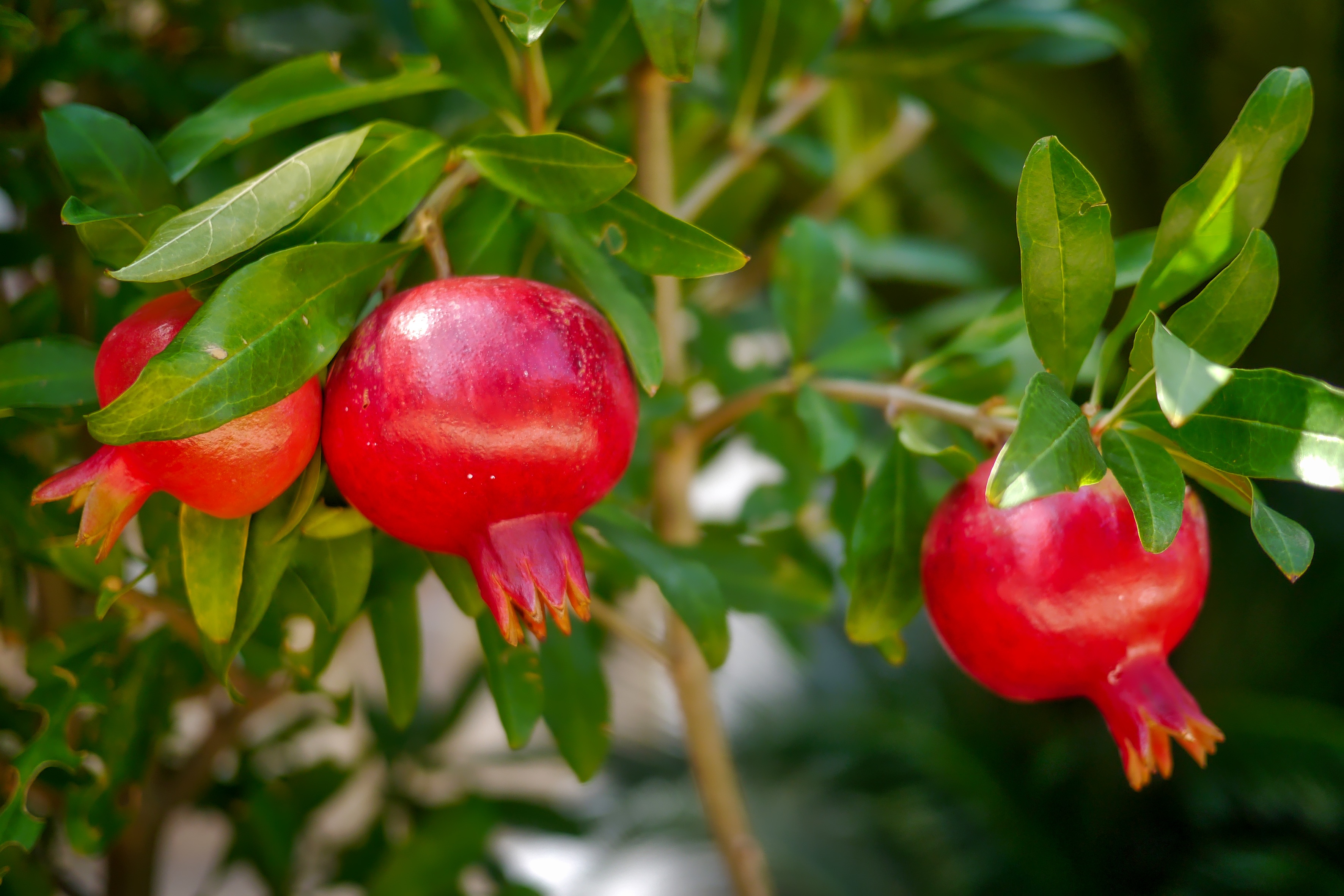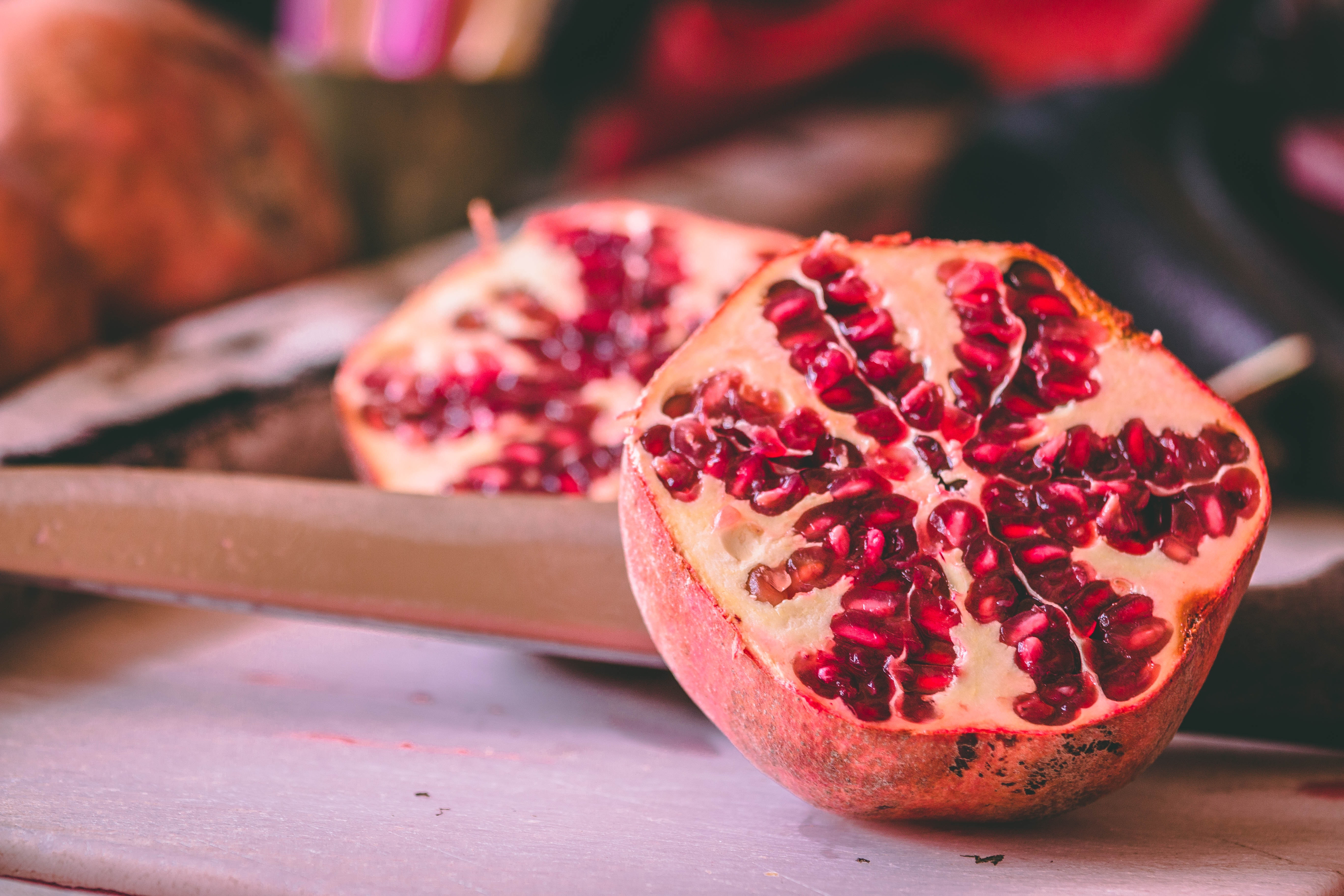Benefits of Pomegranates

Did you know that pomegranates are berries and their seeds are called arils? The fruit grows on a shrub and although the skin is thick and inedible, the arils can be eaten raw or processed into pomegranate juice. Pomegranates are considered by many to be one of the healthiest foods you can eat, as one cup of the arils contain 30% of our Recommended Daily Intake (RDI) of vitamin C, 36% of vitamin K, 15% of folate, 12% of potassium, 7 grams of fiber, 3 grams of protein. Although thy are very sweet and contain 24 grams of sugar per one cup, they contain two important and unique compounds that have health benefits: punicalagins and punicic acid. These two compounds are what gives pomegranates their reputation for being healthy.

Pomegranate Has Super Anti-Inflammatory Effects
Punicalagin

Punicic Acid
Punicic acid, found in pomegranate seed oil, is the main fatty acid in the arils. It’s a type of conjugated linoleic acid with potent biological effects. Punicic acid has a broad-spectrum anti-inflammatory effects and can is being studied for its use as a natural therapeutic agent (as therapeutic substitute) against various inflammatory diseases, cancer, and neurodegenerative diseases like Alzheimer’s.

Prostate cancer is a common type of cancer in men. Laboratory studies suggest that pomegranate extract may slow cancer cell reproduction and even induce apoptosis, or cell death, in cancer cells (8, 9). The prostate-specific antigen (PSA) is a blood marker for prostate cancer. Men whose PSA levels double in a short period of time are at an increased risk of death from prostate cancer. Interestingly, a human study found that drinking 8 ounces (237 ml) of pomegranate juice per day increased the PSA doubling time from 15 months to 54 months — a monumental increase (10). A follow-up study found similar improvements using a type of pomegranate extract called POMx (11).
SUMMARYPreliminary evidence indicates that pomegranate juice can be useful in men with prostate cancer, potentially inhibiting cancer growth and lowering the risk of death.
Breast cancer is one of the most common types of cancer in women.Pomegranate extract may inhibit the reproduction of breast cancer cells — even killing some of them (12, 13, 14).However, the evidence is currently limited to laboratory studies. More research is needed before any claims can be made.
SUMMARYLaboratory studies suggest that pomegranate extract can help fight breast cancer cells, but human studies are needed.
High blood pressure (hypertension) is one of the leading drivers of heart attacks and strokes. In one study, people with hypertension had a significant reduction in blood pressure after consuming 5 ounces (150 ml) of pomegranate juice daily for two weeks (15). Other studies have found similar effects, especially for systolic blood pressure, which is the higher number in a blood pressure reading (16, 17).
SUMMARYRegular intake of pomegranate juice has been shown to lower blood pressure levels in as little as two weeks.
Arthritis is a common problem in Western countries. There are many different types, but most involve some form of inflammation in the joints. Given that the plant compounds in pomegranate have anti-inflammatory effects, it makes sense that they could help treat arthritis. Interestingly, laboratory studies suggest that pomegranate extract can block enzymes that are known to damage joints in people with osteoarthritis (18, 19). This extract has also been shown to relieve arthritis in mice, but evidence from human-based research is very limited so far (20, 21).
SUMMARYStudies in animals and isolated cells indicate that pomegranate extract may be beneficial against several forms of arthritis, but human research is needed.
Heart disease is currently the world’s most common cause of premature death (22). It’s a complicated disease, driven by many different factors. Punicic acid, the main fatty acid in pomegranate, may help protect against several steps in the heart disease process. A 4-week study in 51 people with high triglyceride levels showed that 800 mg of pomegranate seed oil per day significantly lowered triglycerides and improved the triglyceride-HDL ratio (23).Another study looked at the effects of pomegranate juice in people with type 2 diabetes and high cholesterol. They noted significant reductions in “bad” LDL cholesterol, as well as other improvements (24).Pomegranate juice has also been shown — in both animal and human studies — to protect LDL cholesterol particles from oxidation, one of the key steps in the pathway towards heart disease (25, 26, 27, 28).Finally, one research analysis concluded that pomegranate juice reduces high blood pressure, which is a major risk factor for heart disease (29).
SUMMARYSeveral human studies have shown that pomegranate can have benefits against heart disease. It improves your cholesterol profile and protects LDL cholesterol from oxidative damage.
The plant compounds in pomegranate can help fight harmful microorganisms (32).For example, they have been shown to combat some types of bacteria as well as the yeast Candida albicans (33, 34).The anti-bacterial and anti-fungal effects may also be protective against infections and inflammation in your mouth. This includes conditions like gingivitis, periodontitis and denture stomatitis (35, 36).
SUMMARYPomegranate has antibacterial and antiviral properties which may be useful against common gum diseases and yeast infections.
There is some evidence that pomegranate can improve memory. One study in surgical patients found that 2 grams of pomegranate extract prevented deficits in memory after surgery (37). Another study in 28 older adults with memory complaints found that 8 ounces (237 ml) of pomegranate juice per day significantly improved markers of verbal and visual memory (38). Studies in mice also suggest that pomegranate may help fight Alzheimer’s disease (39).
SUMMARYSome evidence shows that pomegranate may improve memory in older adults and post-surgery. In addition, studies in mice suggest that it may protect against Alzheimer’s disease.
Pomegranate is rich in dietary nitrates, which have been shown to improve exercise performance. A study in 19 athletes running on a treadmill showed that one gram of pomegranate extract 30 minutes before exercise significantly enhanced blood flow, delaying the onset of fatigue and increasing exercise efficiency (40). More studies are needed, but it seems that pomegranate — like beets — may be beneficial for physical performance.
SUMMARYAs a rich source of nitrates, pomegranate may improve exercise performance by increasing blood flow.
Pomegranates are one of the healthiest foods on the planet, packed with nutrients and powerful plant compounds.They have wide-ranging benefits and may help reduce your risk of various serious illnesses, including heart disease, cancer, arthritis and other inflammatory conditions.What’s more, they may boost your memory and exercise performance.If you want to reap the many health benefits pomegranates have to offer, either eat the arils directly or drink pomegranate juice.
